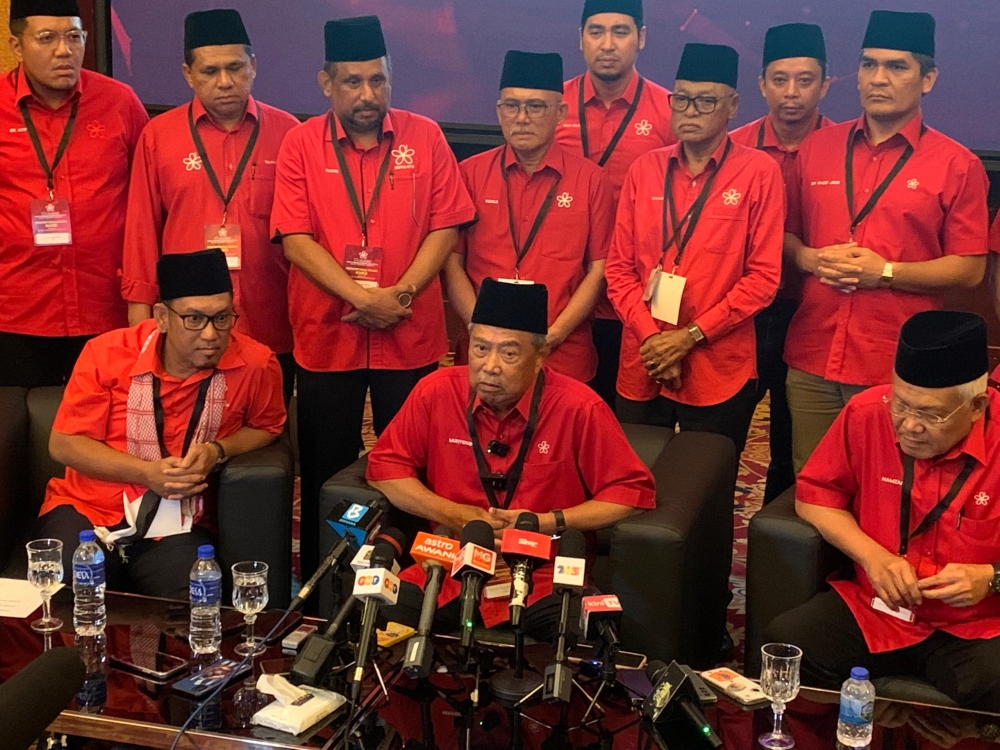Will Bersatu's controversial constitutional amendments bring good or have potential ramifications?

In a signification move aimed at addressing internal rifts and asserting party discipline, Parti Pribumi Bersatu Malaysia (Bersatu) recently convened an Extraordinary General Meeting (EGM) on March 2, to enact crucial amendments to its constitution.
This EGM, held amidst heightened political tensions, sought to close existing loopholes and define clearer guidelines for party members, especially elected representatives, to uphold party loyalty and integrity.
Closing the 'Loophole'
During the EGM, which saw the participation of approximately 1,000 party delegates from across the nation, Bersatu approved amendments to its constitution aimed at addressing recent challenges concerning party defections and support for rival political figures.
Notably, the amendments were devised to close a perceived ‘loophole’ that allowed six Bersatu Members of Parliament (MPs) to express support for Prime Minister Datuk Seri Anwar Ibrahim without forfeiting their party membership.
Bersatu’s Supreme Council Member, Datuk Wan Saiful Wan Jan had emphasised the importance of these amendments in preserving party unity and discipline.
He highlighted the unanimous approval of the amendments by Bersatu's delegates during the EGM, signalling the party's firm stance against disloyalty and betrayal.
The amendments introduced at the EGM included the addition of three sub-clauses to Bersatu's constitution.
These three provisions comprise Article 10.4, stipulating that any Bersatu members holding positions in the Dewan Rakyat or state legislative assemblies who fail to adhere to directives issued by the party’s supreme council as outlined in Article 10.5 shall have their Bersatu membership terminated immediately.
The additional sub-clause, Article 10.5, empowers the Bersatu supreme council to issue written directives to any or all of its Dewan Rakyat or state legislative assembly members.
The third sub-clause, adopted by Bersatu delegates during the EGM, pertains to Article 10.4 and mandates the secretary-general, under the directive of the supreme council, to formally notify the affected member of their immediate termination of membership and removal from Bersatu’s party registry system.
These sub-clauses, crafted to address the specific concerns raised by recent events, would empower the party's supreme council to take decisive action against members who deviate from party directives.
Implications of the Amendments
Additionally, Bersatu President Tan Sri Muhyiddin Yassin elaborated on the implications of these amendments, highlighting their alignment with the Federal Constitution's provisions and their potential invocation of the anti-hopping law.
Muhyiddin emphasised that the amendments would lead to the automatic cessation of membership for MPs or state legislative members who act contrary to the party's policies, thereby triggering the vacancy of their seats.
Following the endorsement of these revisions during Bersatu's EGM, Muhyiddin said the party would seek approval from the Registrar of Societies (RoS) for the amended constitution.
Once the RoS sanctions the modifications, Bersatu will promptly implement these regulations. Bersatu Secretary-General Datuk Seri Hamzah Zainudin will then correspond with all six Bersatu members, seeking verification of their support for Anwar.
If they affirm their support, the constitutional provisions mandating the vacation of their seats will be enforced.
Crucially, Bersatu's constitutional amendments are poised to redefine the consequences for party defections and disloyalty, marking a significant departure from previous disciplinary measures.
These amendments aim to bolster the party's internal cohesion and resilience amid evolving political dynamics, ensuring that party members uphold their allegiance and accountability.
The six MPs who went rogue since last year are Zahari Kechik (Jeli), Iskandar Dzulkarnain Abdul Khalid (Kuala Kangsar), Syed Abu Hussin Hafiz Syed Abdul Fasal (Bukit Gantang), Suhaili Abdul Rahman (Labuan), Mohd Azizi Abu Naim (Gua Musang) and Tanjong Karang MP Datuk Dr Zulkafperi Hanapi.
Potential Ramifications
However, concerns have been raised regarding the retroactive application of these measures amidst the fervour surrounding Bersatu's EGM and its consequential amendments.
Bersatu Women's Wing Deputy Chief Datuk Mas Ermieyati Samsudin cautioned against the retroactive implementation of the amendments, advocating for fairness and adherence to legal principles.
As Bersatu awaits the RoS’s approval for the constitutional amendments, the party braces for potential ramifications, including the possibility of vacant parliamentary seats and subsequent by-elections.
The outcome of these developments remains pivotal, shaping Bersatu's trajectory and influence within Malaysia's political landscape.











